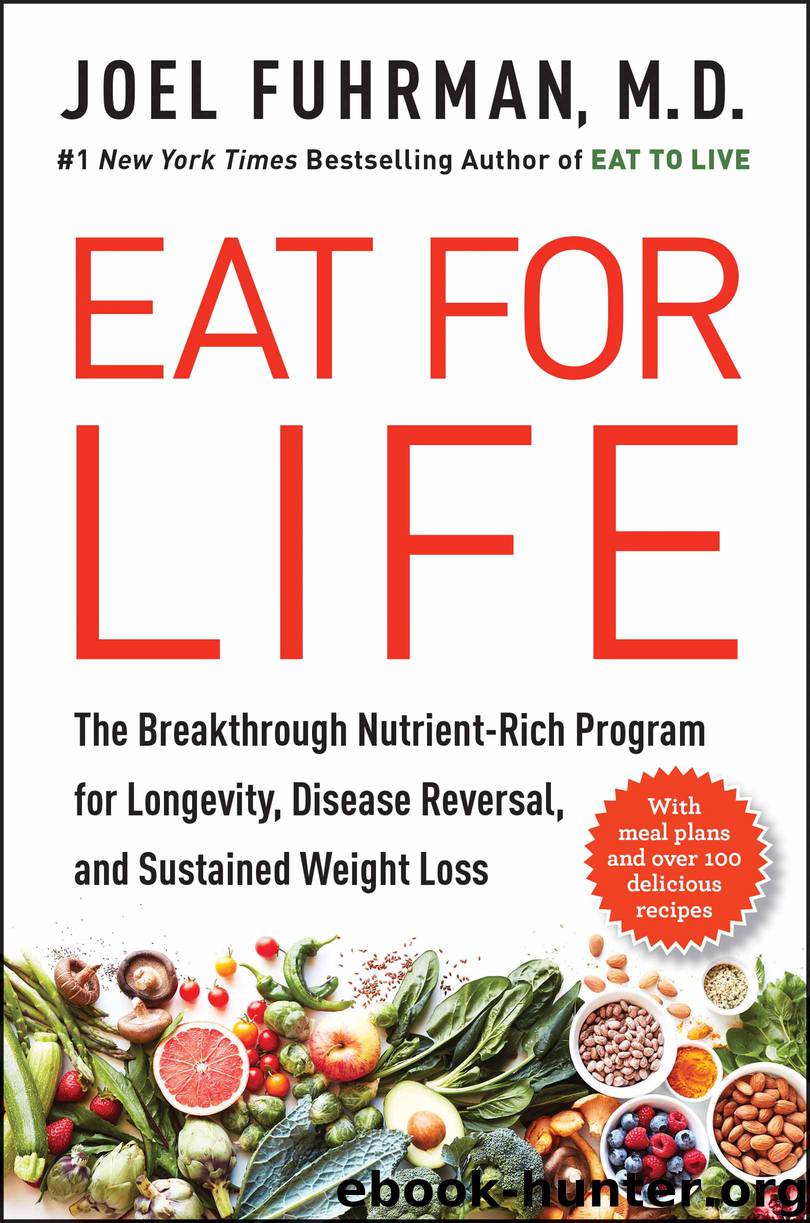Eat for Life by Joel Fuhrman M.D

Author:Joel Fuhrman, M.D.
Language: eng
Format: epub
Publisher: HarperCollins
Published: 2019-12-22T16:00:00+00:00
A Nutritarian diet style does more than address one or two heart disease risk factors. Unlike taking a cholesterol-lowering medication or one or more drugs to lower blood pressure, this eating style addresses and repairs scores of elements that govern your future cardiovascular health. For example, the inner lining of the blood vessels will become smoother and less inflamed and the vessel walls will become more elastic; thus, more oxygenated blood will be able to fill the coronary arteries. And so importantly, your LDL cholesterol no longer will be oxidized. Remember, oxidized LDL is the bad actor. A Nutritarian diet floods the body with antioxidants that radically lower oxidized LDL. This means you become resistant to heart disease, diabetes, and cancer and improve your immune function, which protects you against virus-induced inflammation and dangerous infections too.
Is it possible to predict whether a heart attack is likely to happen in the near future? Yes, because when the lining of the blood vessels (the endothelium) becomes ragged and inflamed and the LDL molecule becomes heavily oxidized, the risk of having a heart attack is very high.1 These markers measure endothelial inflammation and cholesterol oxidation, so when they are elevated, a person is in trouble. The good news is that a Nutritarian diet quickly normalizes these values, preventing danger and death within weeks—not years—of starting the program.
Why is a Nutritarian diet the most effective program to eliminate vascular inflammation, lower blood pressure, and reverse heart disease? Because it checks every box to slow aging and maximize health, including body fat reduction, ideal nutrient bioavailability, antioxidant capacity to reduce inflammation, and nutritional completeness. I have treated tens of thousands of patients using this diet style, with incredible results; the complete reversal of high blood pressure, angina, and high cholesterol has been routine and predictable.
A Nutritarian diet is a lower-glycemic approach compared with a low-fat vegan diet and contains more micronutrients, antioxidants, and favorable exposure to fatty acids for protection of cells and protection against cardiac arrhythmias. A Nutritarian diet has all the benefits that are gained from restricting animal products, without the deficiencies that doing so can impose.
Low-carbohydrate ketogenic and paleo diets are very popular and may have some effectiveness for weight control, but they fail miserably in terms of long-term cardiovascular risks. We give studies the most credence when they meet three criteria: First, they examine many thousands of people; second, they go on for many years, even decades; and third, they look at “hard” endpoints, such as heart attack or cardiovascular death. Proponents of low-carbohydrate diets, such as keto and paleo, point to short-term studies on weight loss and cardiovascular risk markers (“soft” endpoints) to back up their claims. Yes, it is true that when people cut out foods such as white flour, sugar, white rice, and white potato, they lose weight; and that initial weight loss leads to improvements in indicators of cardiovascular and metabolic health. However, it is important to remember that these are short-term studies. Diets that produce weight loss in the short term do not necessarily promote health and longevity in the long term.
Download
This site does not store any files on its server. We only index and link to content provided by other sites. Please contact the content providers to delete copyright contents if any and email us, we'll remove relevant links or contents immediately.
The Bone Broth Miracle: How an Ancient Remedy Can Improve Health, Fight Aging, and Boost Beauty by Ariane Resnick(16595)
How to Be a Bawse: A Guide to Conquering Life by Lilly Singh(7466)
The Fat Loss Plan by Joe Wicks(4904)
The Ultimate Bodybuilding Cookbook by Kendall Lou Schmidt(3933)
The French Women Don't Get Fat Cookbook by Mireille Guiliano(3651)
A Jewish Baker's Pastry Secrets: Recipes from a New York Baking Legend for Strudel, Stollen, Danishes, Puff Pastry, and More by George Greenstein(3585)
Better Homes and Gardens New Cookbook by Better Homes & Gardens(3580)
Super Food Family Classics by Jamie Oliver(3404)
Dinner in an Instant by Melissa Clark(3156)
Bread Revolution by Peter Reinhart(3122)
Tom Kerridge's Dopamine Diet: My low-carb, stay-happy way to lose weight by Kerridge Tom(3096)
Body Love by Kelly LeVeque(3053)
Ottolenghi - The Cookbook by Yotam Ottolenghi(2928)
Flavor Flours by Alice Medrich(2860)
Tone Your Tummy Type by Denise Austin(2836)
The Fat Chance Cookbook by Robert H. Lustig(2831)
Oh She Glows Every Day by Angela Liddon(2771)
LL Cool J's Platinum 360 Diet and Lifestyle by LL Cool J(2728)
The Kitchen Counter Cooking School by Kathleen Flinn(2515)
